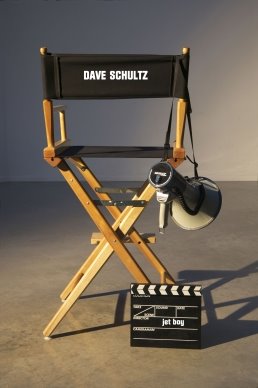 The feature film debut of Writer/Director Dave Schultz, Jet Boy, is a drama about a boy attempting to figure out his future. It has been ten years since Jet Boy was released, but the interest in it hasn’t stopped since. Withstanding the test of time, the small independent Canadian production won its well-deserved place among the classics that shape the coming of age genre as a truly thought-provoking, poignant drama.
The feature film debut of Writer/Director Dave Schultz, Jet Boy, is a drama about a boy attempting to figure out his future. It has been ten years since Jet Boy was released, but the interest in it hasn’t stopped since. Withstanding the test of time, the small independent Canadian production won its well-deserved place among the classics that shape the coming of age genre as a truly thought-provoking, poignant drama.
David Schultz was born in Winnipeg, Canada in 1963. He took courses in cinema and television, stage and radio arts at the Southern Alberta Institute of Technology and at Mount Royal College in Calgary. Due to the immense interest in the film, we called Mr. Shultz and asked him if he would be willing to give an exclusive interview for the skykid.com – the site with the strongest focus on coming-of-age films and adolescent development of any on the Net. He agreed.
Below are his thoughts. After you check out the interview and the film review itself, please don’t forget to leave us a comment. We hope that, once again, we have exceeded your expectations in providing the extremely interesting and exclusive content for which this site is known.
TheSkyKid.com: Jet Boy was your feature film debut, released in 2001. Do you think that nowadays it would be easier or harder to shoot the film?
Dave Schultz: I think it would be harder now, mainly because it would be impossible to finance. The world of movies basically breaks down to Hollywood and, then, everyone else. It’s getting very, very, very hard to finance motion pictures now, especially in Canada.
You know, making movies is very time-consuming. It still takes sixty people to make a movie and no one wants to do drama anymore. They all want to do action films or suspense thrillers or horror movies. It’s very hard to do a straight drama.
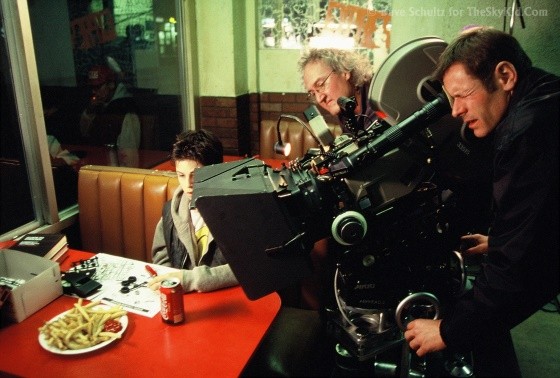
Jet Boy was made on a $1.4 million dollar budget, which at the time seemed like a lot of money to me. These days, that’s not very much money to make a movie, but at the time that seemed like a lot. We would just not get the money today. Most of the money for Jet Boy came from Italy.
Making a movie with delicate subject matter
When you do a movie with young children in Canada, there are a lot of rules and regulations with the unions. When we did Jet Boy, the producer brought in a psychologist for Branden because some adults get so messed up thinking that these kids are going to somehow get all screwed up making a movie with delicate subject matter. This, in fact, is quite funny because Branden was fourteen when he made Jet Boy. And I think there are scenes in the movie now, I know it sounds hard to believe, but I think the bedroom scene and stuff like that would be very difficult to do today. I think, you know it sounds crazy, but I don’t think we would have been able to shoot those scenes. Even though they are suggestive, they are not pornographic in any way. I think some of that stuff is going to be tougher to do today.
The subject matter too, of course, was very difficult at the time. We were very lucky because most movies in Canada are financed through television and the gatekeepers — the broadcasters that put money into Jet Boy in Canada – were women and were a lot more sensitive to the subject matter. They were not afraid of it. While a man, for example, would be more reserved because they would be afraid of any possible association with the subject matter — even if that is a ridiculous way of thinking. But, believe it or not, that was how the thinking was ten years ago. And I think it was easier because we had females who were the broadcasters, green-lighting the project. For them, those stigmas and those issues did not arise.
People do less with movies now than they did twenty years ago or even thirty. When you look at movies made in the late 60s like Death in Venice, The Night Porter or Midnight Cowboy (that was made in 1969), Hollywood does not makes movies like that anymore. They are too afraid to and the audiences are too small. Having a cult film is great, but it doesn’t necessarily make you any money. That’s why you don’t see a lot of movies you really want to see, because everything these days has to be a big blockbuster. And then, in the rest of the world like Canada and other countries, when you are trying to make a smaller movie, like a Jet Boy type of a film, they are getting tougher to finance. The last movie I did, 45 RPM, cost $3.5M and that is considered low budget now and a very small movie.
The problem is when you write a movie from your heart or you are trying to make a statement in your films, it’s like you want to make a statement on life. I think maybe that’s the reason you like coming-of-age movies, and the reason I do. And movies these days, the way they are financed, you really don’t have a chance to say anything from the heart. It’s all about guns and bullets and that kind of stuff.
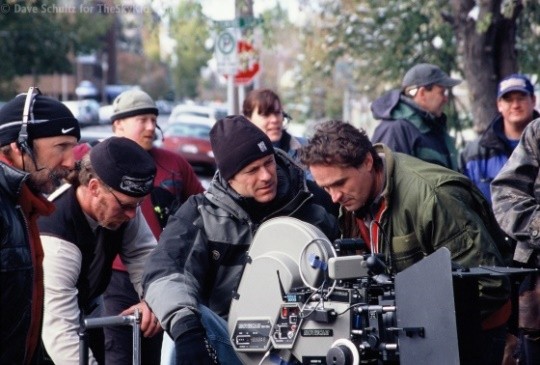
The problem we have making movies in Canada is that we have America glued to the side of us. So you are very overpowered by American films. It’s very, very difficult to make a film of any type in Canada. The fact is the movie business in North America is run by Hollywood and they control all the movie screens, including those in Canada. And even Canadians would much prefer to watch Harry Potter then to watch Jet Boy, for example. Jet Boy is more popular in Latin America and Europe then it is in North America. It never got a US television deal.


TheSkyKid.com:Did you anticipate Jet Boy becoming an icon movie? I use the word “icon” as the interest in it hasn’t stopped. If anything, it’s increased in recent years, which is quite an achievement on its own.
Dave Schultz: I am quite shocked. Because what happens with movies is that they go out there and then you don’t really know what happens with them. Jet Boy was made ten years ago; I mean Branden is 24 years old now. I just saw him a couple of weeks ago and he is not a little boy anymore. So what happens is that you make the movie and send it out there in the world and then you are trying to make a living and you are working on other movies and you are writing other movies for other people, trying to finance your next movie. For me, it takes five years, at least, to finance another picture. Remember, I’m not a big time Hollywood player. I am a small type film maker in Canada. So what happens is the movie goes out there and you sell off your international distribution rights, you sell off your Canadian rights and you don’t really know what is going on. I don’t really know when the movie is showing or who is taking the option to show it when and where. That just happens. I am never told. I don’t know when it’s on television. You sell these rights off and they take your movie — and this is a small movie, it’s not a Hollywood movie – not Paramount pictures or Universal, it’s a small Canadian film. So it goes out there and you kind of lose track of it.
Where the real marketplace is, is on television – not theatrical — And the Internet obviously has its role. What happens with the Internet, which is kind of sad, is that you get your movie ripped off a lot. Many people think: Why buy Jet Boy on DVD when I can download it? And for a really small movie that’s like a double-edged sword. The fact that people are downloading it and sharing it makes the movie more popular because more people get to see it. Yet, at the same time, you aren’t making any money from it. That’s why it’s so hard to put out a new DVD.
You know, the 35mm negative for Jet Boy is at Technicolor in Vancouver. But to transfer it to HD would probably cost about $10,000 and that’s just to strike a video master from the negative. So to make a Blue Ray version and market it, you’re probably going to spend about $20,000. So you better hope to God that you can sell 500 or a 1000 units at $30 apiece to recoup your money. But if the film is being downloaded for free ….? That’s why there isn’t a Blue Ray version of Jet Boy — not yet anyway.
I had no idea Jet Boy was going to become so popular. But I think it’s popular because the message is universal. When we did that film here (Canada), and we did a marketing survey on it, the movie actually appealed to girls fourteen to thirty-five – because it’s very sentimental. I think that what’s essential with Jet Boy is that there’s this kid with his really tough life story and yet there is a potential there – if you happen to meet the right person or meet some good people — then maybe your life just might work out. So the movie is about hope. That is what Jet Boy is about.

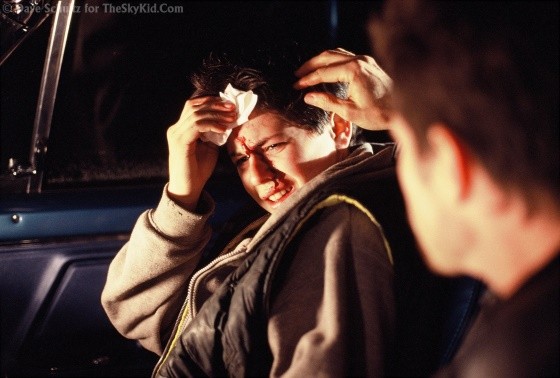
TheSkyKid.com: Your film is generally known either as a Jet Boy or as Moments. Are these titles related in any way or was this a decision made by its distributors?
Dave Schultz: Distributors did that. There is also a French-language version for Canada that’s called Lost Innocence – L’Engance Perdue. The distributors just pick it. I don’t have anything to do with these titles. Overseas, they just decide to call it whatever they want. And, if you notice, the marketing is very different. The Jet Boy for North America was the gun image and the drugs and all that, while the marketing for the Moments version is basically the very touching hug shot with Dylan Walsh and the boy. So they have a different eye on how they want to market it as well.

TheSkyKid.com: Many reviewers on IMDb call Jet Boy a road movie. Others refer to it as a psychological drama. I personally consider it to be a coming of age film? What’s your take on these classifications?
Dave Schultz: I think it’s all of those. I have always tended to like road movies. In Canada, you don’t get a lot of money to make a film. So you always have to do a movie where you are outside a lot and have a very small cast. I would say it’s a psychological drama, but I will agree with you it’s a coming of age film. It’s about that time in your life when there are events that change you from a boy into a man or a young man, and I guess that’s what coming of age means. It’s about taking that step to where there is no turning back. So I would say that it is a coming of age road movie.

TheSkyKid.com: Many of the films you wrote and have produced might be called crime dramas. Do you have any background in law enforcement?
Dave Schultz: Those movies are just popular to write. A lot of them are television films that are done for the American networks or the cable networks. I have a knack for being able to write a script very fast. And, no, I don’t have any background in law enforcement. But suspense thrillers sell to television very, very well. These are movies you write for a living ….it’s kind of like there are things you do for passion and there are things you do for a living. In between doing Jet Boy, 45 R.P.M and the vampire film Rufus (a new film I’m going to be doing), I have written a WWII movie and I have written some psychological dramas. These are movies for other people. They are kind of bread and butter. You don’t wake up saying, “Oh. I’m going to write these movies”. You have people contact you and that is what you do as a writer. But it’s much more fun writing your own movie. I mean, all my movies are very similar. If you are watch 45 R.P.M. and Jet Boy and Rufus, they all have a central character like Nathan was for Jet Boy. I still call Brenden the Jet Boy. I don`t think he likes it but …but it’s like “oh the Jet Boy is coming to town.” I guess the Jet Boy is also kind of a version of me. You know — that Mark Twain thing – was he Tom Sawyer or Huckleberry Finn? No. He was not. But then, in a way, I guess he was.

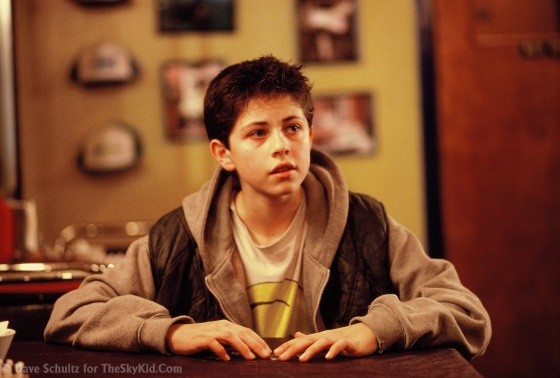
TheSkyKid.com: Many people believe that one of the secrets for the success of Jet Boy was the casting of Branden Nadon in one of the lead roles. His acting abilities and facial expressions contributed greatly to the emotional impact of the film. What were you looking for during the casting for this role and what set Branden apart from the rest of the boys who applied for the role? Could you talk about how he was to work with on the set?
Dave Schultz: What is very interesting with Branden is that he never acted before. Believe it or not, it’s really hard to find kids that age, because most kids start acting when they are very, very young. Their moms start dragging them around when they are like five years old.
So when you do a movie, and you have kids that are 12 and under, they either act or they don’t. I’m sure you’ve seen those movies with little kids – and you either believe them or you don’t believe them. And with teenage boys especially – the girls don’t have this problem — but boys, when they hit that 14-year-old age and start going through puberty, they become overly self-conscious of how they look.
Think about it. You have Branden at an age when he’s worried about how his hair looks or if he has a pimple. Young actors worry how they look to other people and yet they have to make the movie. So it’s very, very hard on them. Therefore, it’s a very difficult age to cast. It’s very hard to find a 14-year-old who can act. Like I said, Branden never acted before. Most of the kids in my movies have never acted and you just find the right one and it just works out.
The biggest problem I had with Branden was I thought he was too cute. Because when I envisioned Nathan in Jet Boy I didn’t envision him being that cute. And Branden was very cute for a 14-year-old. But you always go with the best actor.
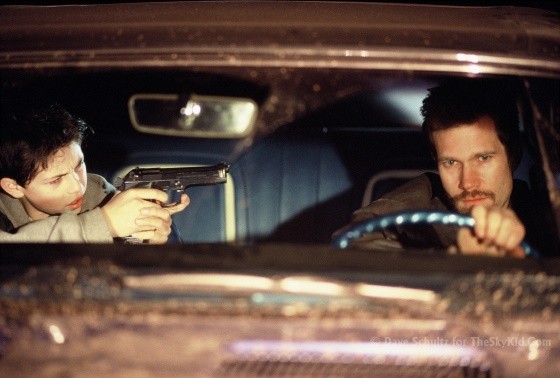
I originally pictured Nathan as kind of plain and having long, greasy hair. But Branden came along out of nowhere – he didn’t even have an agent. He just showed up at an audition in Vancouver and he was just the right kid. Branden had been sick. He had undergone an operation for a bad appendix and something went wrong. So, when he came on set, he was very pale and I remember the First Assistant Director saying, “Oh my God! Is that kid ever pale!” And he asked, “Is that makeup?” and I said, “No. That’s just him”. So, when you see Branden in the movie, he looks kind of pale.
Branden had some allergies and stuff. The scene that I will always remember is the one in which he’s making the eggs for breakfast. If you look at Branden’s eyes, they are very runny looking. There is kind of a purple underneath and he used to hate that. He was like, “Oh God! I don’t look so good”. And I would say, “Oh no. You look just perfect” – I thought it was just the perfect look. But for him, as I’ve said, being a young man he was very self-conscious.
So Branden was pale and Dylan Walsh (Boon) was very tanned. When you are exposing motion picture film — and you have two actors in the scene, one very pale and the other one very tanned – it’s really hard to tackle the exposure.
Also of interest, there were other scenes in the movie that we shot and left out because they were written to show that Nathan was a sympathetic character. But, because Branden’s appearance naturally made him look so sympathetic, we ended up cutting most of them out.
So I guess the short answer to the question is that I’ve found, when going with kids, it’s best to find someone who hasn’t acted. And you just get to know them very well and you pick the best actor. Like I said, the only thing I can say as a negative about Branden is that I thought he was too cute. But I guess, in the long run, that turned out fine because it made him very sympathetic. And, as I said, he was a bit sickly at the time and I guess that is what gave him that kind of a worn-out, “on the road” look. Dylan Walsh was great, too, and he and Branden got along very, very well.
You have to remember Branden was very young when we made this movie and there is subject matter in the film that is very difficult for a kid that age. I mean Branden is no street kid. He was a middle-class boy from a good Catholic household — So some of the subject matter, like the scenes with the guy who picked him up on the street at the end of the film — that was difficult stuff.
One thing I remember during the shoot is Branden eating supper with the guy who played the older man in the film who picked him from the streets. That guy was scared to death, because a grown man, of course, doesn’t want to play such roles. And so he was very nervous about the whole thing. I remember Branden eating supper with him, talking and kind of looking at him. They were chatting together and then Branden said, “Don’t worry man. It’s just a movie.” And that came from a kid who had never been in a movie.
We shot Jet Boy in 20 days, which is really quick and we had tough stuff to film. And, of course, the parents were there too. With kids under sixteen, the parents are always there, off-screen, watching the video assist monitor. So yeah, even for the Director it’s very difficult at times. The parents are watching. The scene where Branden had to get in the bed with Dylan – remember, there are forty people in the room — it’s a regular film set – so it looks like they’re alone in the bedroom but, in fact, there are forty people in that room. So it’s really embarrassing. I still remember the crew setting and tweaking lights and there is Branden standing around in his underwear watching as all these crew people are moving around. But, yes, Branden was a brave kid. He and I get along very well, still. And you know, a lot of kids could not have pulled off that role.
So, yes, I think Branden made the movie. He made the movie special. He was young — very young. Normally, you cast older kids to play that role. It was my first movie, so I didn’t realize you were supposed to cast a 17-year-old to play fourteen. But, yes, he made the movie. Damn right he did. Not only by his on-screen presence but also his off-screen work. It was brave for a boy that young. Because you know how kids can be at school. Jet Boy came out in Canada on Universal Home Video and was in every video store. With the subject matter contained in the film, some of the kids at school gave him a hard time, calling him names and things like that.

TheSkyKid.com: What were the greatest obstacles facing your team during the production and editing if the film?
Dave Schultz: I think the subject matter of the film was hard. You know there are always camera problems and there are always technical problems. But I think the biggest obstacle was the subject matter. It was very tough to edit. There was stuff we had to leave out. There were things that were in the script that we did not shoot. It made it hard for selling. I mean that is why in America they would not touch it at first. It’s funny because Jet Boy is almost kind of a Disney version of the story of a boy hustler, almost with that kind of family feel to it. And then, at the same time, it’s very dark. So I think the biggest obstacle was just the subject matter of the film itself. To shoot Jet Boy again would probably be extremely hard. The actors union would probably be at our throats – they are terrified. The last movie I did – they didn’t even want the kid to drive a car. You pay these teenagers money to do a movie and then someone thinks that they are made out of glass or something. And, in reality, Jet Boy was a very positive experience for Branden and actually he is a stuntman now, if you can believe that. He left acting for a while to go into business with his father, but is now is back in Vancouver.

TheSkyKid.com: The character of Nathan strikes me as a loner, not too popular in school and coming from a dysfunctional family. Does this fit into any stereotype that society might have for boys like him?
Dave Schultz: It’s very interesting. Of course, he is a loner, because you know a boy like Nathan has a lot of secrets to hide. So of course they are loners at school. And the truth is there are thousands of Nathans out there. Branden was telling me a while ago that he got a call from the Baltimore police department, and some kid who used to be a hustler had committed suicide. The movie Jet Boy was playing on a DVD when they found him and he had drawings from the movie and even had the tattoo on his arm. When Brenden was in town a couple of weeks ago, he wanted to tell me the story and I found it way too disturbing to get into the facts, but …
Branden said to me, “Dave you won`t believe it, but this kid was just like the boy in the movie. He had the exact same life.” And I said, “Well that’s not really that bizarre. There are thousands of kids like that in the real world and not all of them are entitled to a happy ending.”

TheSkyKid.com: Yes. That is one of the reasons why I typically criticize US made films, because they always tend to be cotton candy stories with happy endings. And they are often too scared to show what the reality is out there.
Dave Schultz: Well no, it’s not because they don’t want to see that reality. But If they do, they want to see it on the Oprah Show and they want to see it on Doctor Phil. It’s just scared Americans, but they don’t mind people getting shot. They love to see people getting killed. You know, let them shoot people, but you can’t show what’s out there in the real world.
I think it’s important when you make a movie – I mean, why go through all this work if you haven’t said anything? I felt bad when Brenden told me the story of this kid in the US who killed himself because obviously, he identified with the character. But unlike the character in the movie, which is fictional, this kid had no way out.

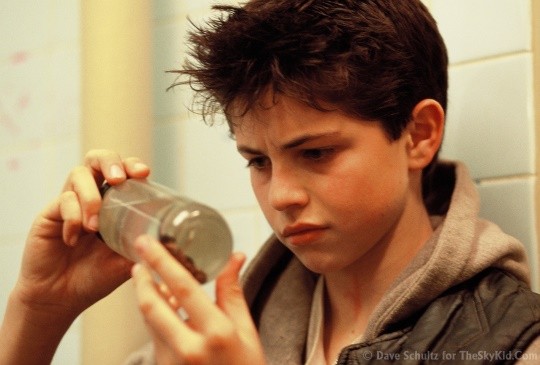
The SkyKid.com: You can buy Jet Boy from main retail websites such as Amazon. Yet, three years ago when I wrote my review of the film, many people were desperately trying to obtain a copy. Is there an explanation as to why the movie was so hard to find for several years?
Dave Schultz: There is an explanation for that. I was in South Africa a couple of years ago doing a lecture in Cape Town at the film school there. I went on to look for some material on Jet Boy, like a poster or something. Then I found out about theskykid.com and the comments on the review of the film. I had no idea that people were watching it overseas and all these people were looking for copies of the movie. Remember, Jet Boy came out just at tail end of the VHS era. It was like in 2001, so DVD had not really taken over yet. All copies of Jet Boy to that point were VHS releases. I put it on Amazon.com because I thought that, for the people who wanted to see the movie, I wanted them to be able to find it and order it. I didn’t realize it would sell that well for an older movie/small title. So I kind of actually did it myself. I thought, “Oh my God! These people actually want to watch the movie, so I better make arrangements so they can do that.”
Like I said earlier, I would like to put out a better version of the film, like an HD version but, at the moment, I just don’t know if it is economically feasible to do that. I’d love to be able to talk with European distributors and do a better version. I’d love to have a dubbed version in Spanish, Russian …etc. It’s just that people don’t realize that it costs a lot of money. Within the next year, I think we might do a new widescreen anamorphic without the letterbox and jazz up the chapters, add the original trailer and some audio commentary… So maybe look for that. I’ll cross my fingers that we can make that happen.

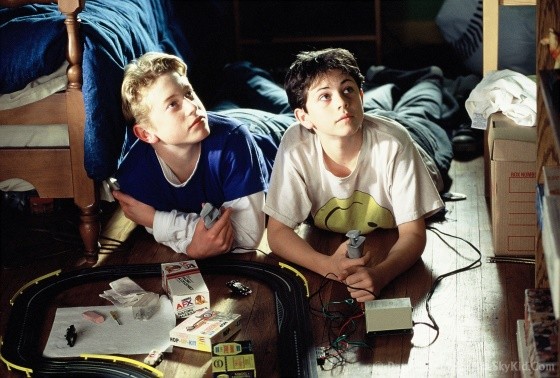
TheSkyKid.com: Despite the harsh life Nathan lives, he wears a t-shirt with a smiley happy face/ sad face. To me, that symbolizes his struggle to reach happiness in his life. Is that a correct assessment?
[quote_center]I just want to be a good kid that’s all[/quote_center]
Dave Schultz: I think you’re right about that – it’s really interesting. The upside-down happy face thing is really cool. I honestly haven’t thought about that because I haven’t watched the film in a long time. And I love the sugar packet. I was actually in a restaurant – and you know in the movie when Boon pulls out these sugar packets and one of them this upside-down happy face on it? — that actually happened to me in real life. I was sitting in a restaurant, pulled out a sugar packet and looked at it, and that’s where that scene came from.
But, yes, you are absolutely right there – the upside-down happy face is a bit of a symbol.
You know, you finish a movie and almost always you are not fully happy with it. You think that you made too many mistakes. Movies, when you shoot them fast, and they are low budget films, you always see a few scenes you’d love to re-shoot. You see the negatives and tend to forget all the good stuff. So I’m glad you brought that up – because, yes, the “up-side-down happy face” does symbolize Nathan’s struggles to find happiness.

TheSkyKid.com: The emotion in many of the scenes between Branden and Dylan looked very real. Could you talk about the directing techniques you utilized to get those two to work so well together?
Dave Schultz: When you work with kids, you really have to get to know them well. Because the one thing they cannot be afraid on the set is the Director. Remember, Branden had never been in a movie before, and I hadn’t directed a movie before. So the only one who was really a pro there was Dylan Walsh. And I’ve got to tell you, Dylan is a great guy. He is a pro. He is a nice man. He understands children very well. So I think that some of the chemistry between Brenden and Dylan came with casting. Part of being a Director is knowing how to cast. Because a film is all in the casting, it is all in the actors. In this film, the chemistry was right and it does show. That is why there are some scenes that are very, very touching and real. Kids learn very quickly too. Also Dylan’s patience, and the fact that Dylan had absolutely no ego, really helped a lot.

TheSkyKid.com: The rhythm and development of the story created a strong emotion. The musical score fit extremely well with the scenes. Can you tell us more about the soundtrack of the film?
Dave Schultz: At first, I thought the movie was overscored. I think, actually, the score was a little heavy-handed. If I were to do it again, I would back it off a little bit. But I guess it’s fine. When you spend a lot of time editing the movie, you don’t spend as much time editing the music. Because by the time you get to the music score, usually the cash has run out.

TheSkyKid.com: The father/son relationship seems to dominate the film. Yet, it did not seem to be working for either the father or the son. While Nathan does not have a father, it soon becomes clear that Boon was never close to his own dad despite the fact that he goes to see him while he is seriously ill. Would you say that is the reason why Boon seemed nervous about acting as a surrogate father to Nathan? If yes, why did he go on pretending that the boy was his son?
Dave Schultz: Well… they are both the same character. Boon is really just Nathan grown up. So, really, they both have bad fathers. I guess there is a little bit of me in these stories. My father died this time last year, actually, and he and I never had a great relationship, but I loved him very much. So, my movies always have a lot of father and son motives and I guess that’s just me being my own psychiatrist. But I think as far as Jet Boy is concerned, Dylan is afraid of Nathan because he immediately knows what Nathan wants from him and he doesn’t feel like he has the emotional range to be a father. And it’s also shown in the fact that, when he goes to see the girl that he was dating as a boy, he could not commit to her either. So if he could not commit to this woman, then how can he commit to this boy? I think it is because they are both very similar characters and, indeed, Boon is the grown up Nathan.

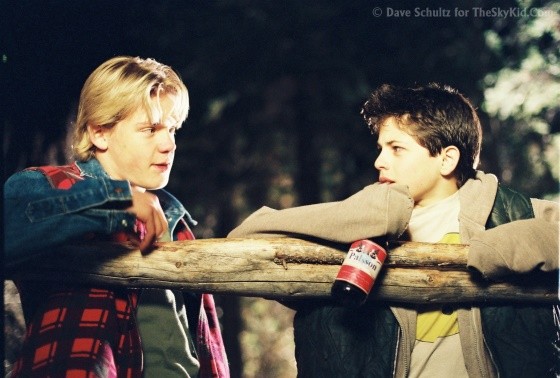
TheSkyKid.com: Could Nathan’s sexuality be considered a function of the lack of an adequate father figure in his life?
Dave Schultz: I don`t think Nathan’s sexuality in the film is really defined. I think the big reason Nathan tries to get that way with Boon is more out of desperation than anything. He does it because he thinks that’s what everyone has always wanted from him. And when he thinks he is going to lose Boon, he pulls out the only tricks he knows. But, with Boon, it doesn’t work.
[quote_right]there are thousands and thousands of Nathans out there[/quote_right]
It’s a very sad thing because, as I said, there are thousands and thousands of Nathans out there. I think that what’s great about this movie is that Boon doesn’t want what the other people want and so Nathan is very, very lucky. Because, at first, you think that Boon is a drug dealer and then what you realize is that the boy has put his trust in the right person, so he is very lucky. For the first time in his life, Nathan is lucky because, when he decided to give his heart and give his all, he gives it to the person who really is the right person to accept it. And that’s why I think that the ending is quite happy and probably Nathan goes on with a much better life because he has met people who care.

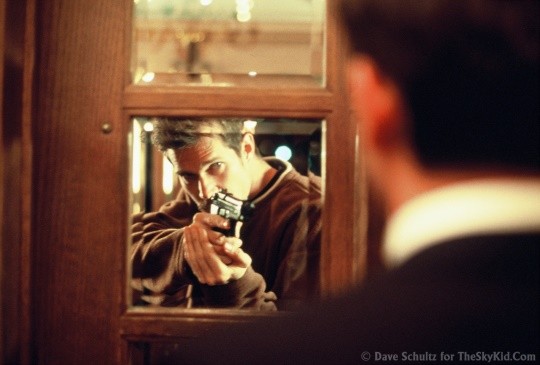
TheSkyKid.com: Let’s finish the interview with a question I always ask filmmakers. As theSkyKid.com mainly focuses on coming-of-age films, it would be interesting to know if you have a favorite coming-of-age film that you could recommend to the people reading this interview.
Dave Schultz: The British movie Kes (1969) is my favorite if you want to call it a coming of age film. I think it is. But there are so many good films out there – if you gave me an hour I could probably think of another twenty films. Like The Go Between is a pretty good film, a bit old school and slow, but it’s a really good one.
I think what Hollywood has stolen from us, in the last couple of years, is the knowledge that movies are supposed to be personal. And I think we have gotten so used to watching Shrek, and all those kind of films. It’s so hard now to make movies. It was easier ten years ago.

TheSkyKid.com:Is there anything you want to add? Any new films or projects you are currently working on?
Dave Schultz : The last thing I want to say is that it’s so cool that you and I are talking right now, because it makes it all worthwhile. You have no idea what is like when you work so hard to make a film and then the years go by and then somebody is talking with you about it and somebody is getting something from it and getting the message. And that is like WOW! How exciting! How important! I mean how much better can it be than that?
Our thanks to Dave Schultz for taking the time to give a very in-depth and informative interview, providing our readers with a very interesting Director’s behind-the-scenes perspective of the making of Jet Boy and the state of independent filmmaking in general. If you’ve enjoyed this interview or just have a general comment about it, please let us know in the comments area provided below.
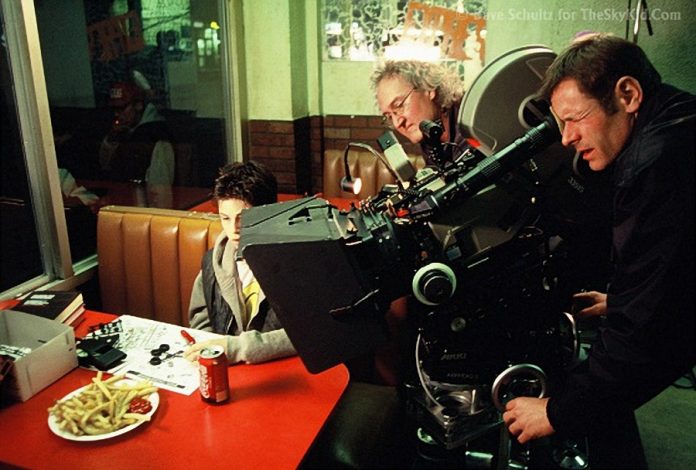
Agree with all the great comments above. Agree it would be hard to make today. The idea that a boy needs a father or might miss him if he doesn’t have one would be tendentious. For me one great aspect of the movie is the ‘healing’ of Boon not just in finally accepting the love of the boy, but in acting to protect him. Historically this has been a part of good masculinity. So not really coming of age, but being accepted on the one side and accepting oneself on the other.
And we still don’t know where the title came from!
About time a HD version was released along with behind the scenes footage. A “making jet boy” bonus section.
Mr. Shultz,
Thanks so much for this interview. Jet Boy is one of the most moving, emotional films I’ve ever seen. This is drama at its best. The character Nathan (Branden Nadon) is so evocative… I had to go out and buy more Kleenex. I can’t imagine this film without him. I think the cute factor helped a great deal with capturing my heart (and breaking it) over and over again! I could see how well Dylan Walsh and he got on. Great casting!!
I have ordered a DVD and will pursue the Director’s Cut when it becomes more affordable (currently selling for something like $90 on Amazon.ca.) It’s disappointing that a Canadian film isn’t more available in Canada!
I will be watching as many of your other films as I can find.
Just one question: I hope this isn’t a dunce question, but why the title “Jet Boy”? I’ve heard of “rent boy” but… where does the “jet” come in?
I really liked the entire movie, Jet Boy, and think Dave should make a sequel.
Boon adopts Nathan legally.
Boon marries Erin has married Erin and now Boon is asked to rescue other street kids, so he asks his adult son Nathan to team up with him.
Another happy ending with a message. The message being you can’t save them all, but you can some.
Please pass this along to Dave Shultz
Bravo, SkyKid – I’m deeply grateful to have found this interview (having only just found the movie!). Wonderful to have some insights into the background of the production….. most of all, perhaps, that Schultz still cherishes his first-born feature film, still worries over some aspects of it, and still appreciates those who appreciate his vision.
Schultz acknowledges that assembling the right cast – and especially finding Branden Nadon – was important in ensuring the movie’s impact and durability. What he modestly fails to mention is the quality of his own script: it is lean and taut, almost poetic in its economy; it allows silence to speak, and the viewer to imagine and empathize. There are discontinuities and coincidences in the screenplay (though the final twist is neat), but the actors had space to act, and the two protagonists did so to telling effect.
A 20-day shoot based on $1.3 million – remarkable! But I suspect the constraints helped things along. Nothing fancy was required, as the tale had its own momentum, and the focus had to stick with essentials. The ruthless editing also kept things tidy. The basic point was made unforgettably: boys need men, but not the sort of men that need boys.
I could write much more about both movie and interview, but let this suffice: many, many thanks, SkyKid. I hope to return and find an interview with Mr Nadon – those three weeks must surely have made a lasting impression on him, one way or another, just as they have on me.
I think this is a haunting movie and some of the other reviewers think so too. The movie was too explicit in places. We did not need explicit visual or audio of the man hug at the beginning of the movie, or for Nathan to be so forthright with Boon when he was caught. We could have grasped what was going on with less. I think being too explicit causes men to squirm a bit, which Schultz expressed in the interview. A lot of men would have stopped watching right at the beginning when Nathan was asked for a hug by his client. For those that persevered it was rewarding. It is the sort of movie that one remembers. Brendan Nadon may have stolen the movie because he was the kid and an excellent actor in his own right
, but Dylan Walsh’s experience as an actor shone through. It all came together into an excellent movie. It deserves all the praise it gets. I don’t know how common the problem of street children is, but I hope that for most it is not as bad as it was for Nathan in the movie.
I somehow fail to see the film as explicit. The movies of the Polish director Wiktor Grodecki are what I consider to be explicit …in Jet Boys many things are implied which you and I am sure many of the other viewers are noticing . I have little to no personal experience with the things addressed in the narrative , however I am aware of at least several cases in which the reality is much , much tougher than any director will dare to show in a film – or any viewer will willingly watch .
Yet movies such as Jet Boy get one thinking and that`s a big achievement on its own.
Thank you for sharing your thoughts . Much appreciated !
I’m not so sure what you personally define as “explicit”, but I’m guessing it’s nothing more than mere personal distaste and intolerance, which I’m sure we all have at something.
Having said that, unless certain individuals have had childhood trauma (or any other sort of post-traumatic stress), I’m pretty confident that very little people actually found the hugging and sex-initiation scene to be an overt problem; most of us “men” have “persevered” it better than you have.
Those scenes defined the story for what it is: by putting these visually provoking aspects in the face of the audience, they developed the implication and help portrayed that there’s a real problem going on in the main character’s life. Without them, we’re just watching a sequence following a little dude who bumped into some sexy-ass adult, who seems to be a drug dealer, who would later bump into the police, who we later learned is actually the Drug dealer’s domain, which the “Drug Dealer” uses to improve the lil’ dude’s life. All worked out in the end and all lived happily ever after. So…has Harry in the next room defeated Voldemort in the catastrophic second wizarding battle yet??? Should have bought a ticket for THAT instead…. o.O
In conclusion, I’m sorry you were too faint-hearted to handle these adult visual scenes and incorporate them as viable components of the story. I really am. Some people find fun and stimulation in pleasantly blander movies. I’m guessing you’re one of them. Perhaps you should go watch a more pg-rated film and stay in that genre.
Wow!!! I feel like I have been slapped around!!!! I am faint-hearted; I should watch Harry Potter movies, which I like; other “men” have “persevered” better than I!!!! I thought the point of making movies was to make money and I thought that my points may have deterred some “men” from watching the movie to completion. I also thought that it was not necessary to have Nathan use the “F” word or to be so explicit about what he was willing to let Boon do to him. Movies are for entertainment and have to appeal to the widest audience possible. By using scenes and language that many may find makes then squirm only makes the movie less attractive to many “men”. Isn’t allusion and allegory the hallmark of good movies?
Sorry that you see me as less than the sort of viewer that you think would appreciate the movie, but if it had appealed to more, then maybe it would have been a greater commercial success.
I thoroughly enjoyed the movie. I know what you mean about Branden Nadon being too clean-cut for the part, but if he had not been then perhaps even more viewers would have had a hard time grieving for the character. A greasy haired street kid would have had a harder time bringer out the sobs in most of us.
I have a new appreciation of Dylan Walsh as an actor. He was excellent in this movie.
I enjoyed the movie and will recommend it to many.
Did not enjoyed 45 RPM as much, Mr Schultz. It was harder to wrap my mind around, but I don’t want to hear from anyone about what I was not grasping when I viewed it!!!!!!!!!!!!!! It just wasn’t as enjoyable as Jet Boy.
Hope I don’t sound angry. Just wanted to straighten out how I felt about a good movie and how I thought it could have appealed to more viewers.
Sad reality: “There are thousands of kids like that in the real world, and not all of them are entitled to a happy ending.”
P.S. Who’s in for a Kickstarter campaign to raise the $20K needed for HD/Blu-ray release?
The interview is really interesting. I have to agree with many of the commentators here. This film is one of the few that you will never forget. Something like that burns itself into the memory.
But: Child prostitution and life stories of these children no one wants to hear. They are uncomfortable and interfere society in the pursuit of trivial things.
So it´s good that movies like this force people to think about their own responsibility. I think it´s our responsibility. We mustn´t longer look away. …
So you can see that this movie makes some people think. They think it´s a duty to help children like Nathan. And they want to punish the pederasts. They are angry.
So movies like this are usefull to enlighten the people.
And what makes that movie so important? Maybe it gives other victims hope. Or it makes parents be more careful.
I felt compassion seeing this movie. And I thought about my life and was grateful that I´ve never been forced to see such a crime or to suffer it.
It’s almost dangerous and politically incorrect to produce a movie that deals with such a topic like this. But that makes it all the more important to produce such movies.
>Thank you for the movie. And the interview.
post scribtum
I am from Germany and I hope my English was not too bad.
felix1896@web.de
German translation
Das Interview (Gespräch) ist sehr interessant. Ich muss vielen der Kommentatoren hier zustimmen. Dieser Film ist einer der wenigen, die man niemals vergessen wird. So etwas brennt sich in das Gedächtnis.
Aber: Kinderprostitution und die Lebensgeschichten dieser Kinder will niemand hören. Sie sind unpassend und stören die Gesellschaft in ihrem Streben nach belanglosen Dingen.
Deshalb ist es gut, dass Filme wie diese die Menschen zwingen über ihre eigene Verantwortung nachzudenken. I denke es ist unsere Verantwortung. Wir dürfen nicht länger weggucken…
So kann man sehen, dass dieser Film manche Menschen zum Nachdenken bewegt. Sie denken, es ist eine Pflicht Kindern wie Nathan zu helfen. Und sie wollen die Päderasten bestrafen. Sie sind wütend.
Also sind Filme wie dieser nützlich um die Menschen aufzuklären.
Und was macht diesen Film so wichtig? Vielleicht gibt er anderen Opfern Hoffnung. Oder es motiviert Eltern vorsichtiger zu sein.
Ich fühlte Mitleid, als ich diesen Film sah. Und ich dachte über mein Leben nach und war dankbar, dass ich noch nie gezwungen war so ein Verbrechen zu sehen oder zu erleiden.
Es ist fast schon gefährlich und politisch unkorrekt einen Film zu produzieren, der von solch einem Thema wie diesen handelt. Aber das macht es umso mehr wichtig solche Filme zu produzieren (drehen).
>Danke dir für den Film. Und für das Interview.
felix1896@web.de
super de bon film du début j’usqu’à la fin j’ai bien aimer les acteurs le petit entre autre est formidable on devrais le refaire en 2012 et le présenter à nouveau dans les salles de cinéma je suis sur qu’il serais populaire ça change des films de violence j’ai été surpris de la fin film super comme idée
I read the interview. And I should say, it was quite interesting. I saw Jet Boy 1 week ago. Swear, then I reviewed it 5 times completely again. And a lot of times I reviewed some moments of the film. That’s absolutely amazing thing!! I can’t stop thinking about the movie. Jetboy just stuck in my head! I want to say “thank you very much” first to David Schultz who is the director/writer (fantastic!) of the movie and all other people who helped him to do that. THANK YOU, guys!!! And, of course, Brandon (Nathan) and Dylan (Boon)! It was unbelievable acting, really! Especially Brandon, damn the first experience!!! …I have no words, absolutely. This is so sad that there is not Blyray version, yet. I hope that copy will be available in the future. I agree with Dave, it’s harder to do such films nowadays (that’s sad too). That’s why I strongly wish that he do similar movie (maybe with Brandon Nadon participation), that’s would be great! I remember many dialogs from the Jet Boy. They just do not go out of my head. Well, it’s too sad that Brandon don’t acting seriously now, because he is fantastic! In the end, sorry for my english, cause I am russian, hope you understand me :) Brilliant picture!!! without any analogues! One of the BEST for me! Finally, waiting other works of Dave and Brandon, they are masters!!
An excellent production, one of the most impacatntes movies I’ve seen so far, this movie should go back to film for new generations to understand that life of some people (Nathan) is much more complicated and sad as ours, and we should be happy with what we have. I am Latin American and the movie in my country for some scenes would be taken as a taboo, but regardless of those scenes (I say this because I have had a Christian education) the movie is one of the best I’ve seen. And that the end of the movie is a reflection of our world every time is more incensible and that there are people so cruel (people degenerate)
Una exelente produccion, una de las peliculas mas impacatntes que he visto hasta ahora, esta pelicula deberia volver al cine para que las nuevas generaciones entiendan que la vida de algunas personas (Nathan) es mucho mas complicada y triste que la nuestra, y deberiamos estar felices con lo que nosotros tenemos. Yo soy latinoamericano y se que la pelicula en mi pais por algunas escenas se tomarian como un tabu, sin embargo sin tomar en cuenta esas escenas (digo esto porque yo he tenido una educacion cristiana) la pelicula es una de las mejores que he visto. Y se que el fin de la pelicula es una refleccion de que nuestro mundo cada ves es mas incensible y que existen personas tan crueles ( personas degeneradas)
I read the whole interview and I just want to tell Mr.Dave S. (i think that’s his name, the person who wrote/directed the film) THIS MOVIE WAS AWESOME. i sow it last night and i cant stop thinking about it! i have gone through things in my life and can really relate to this movie, of course I am 16 and no one feels sympathy but that’s fine ’cause my life is not that bad anymore. But awesome movie!! Please! try to make it in blue ray!! i would most definitely buy it! and I have been promoting it in my fb. you can contact me at cesarlovespotatoes@yahoo.com (silly yahoo name but i did it a long time a go and felt goofy). good luck!
Another thing. I’ve checked all the biggest script sites and it seems the script was never uploaded. If Dave ever reads this, could he tell me where can I find the script? It is frustrating to have all the Hollywood scripts, full or crap and some so badly executed, available and not something that could be really beneficial to students. I need it for educational purpose in a dissertation on Social sciences. Thanks a lot!
How great to find this in-depth interview with Dave Schultz here. I’ve recently discovered the movie Jet Boy (just 10 years after it was made!) and it affected me quite a bit. Just a great story and fantastic performances – something of a gritty fairy tale really, but very hopeful and moving. I can understand why this movie was more popular here in Europe than in the US – there is almost nothing that Hollywood produces these days that I’m interested in seeing. And yes, I did watch Jet Boy online first – I discovered it by accident – but the result is that I went straight to amazon and bought the director’s cut DVD. I hope there are many others out there who do the same, so this movie and those involved in it can enjoy its success.
Thank you for leaving a comment to the interview with Dave Shcultz Greg. I myself would always go for an independent film is I am to choose between it and a Hollywood made ” product ” – not that they do not make excellent movies over there – but the gems are rare and lately hard to spot. Nowadays many people want a movie for a very first time online – even if few would admit it. Of course we now have the streaming technologies and sites – yet their catalogs are filled with predominately ” time wasters “. The director`s cut of Jet Boy is an excellent choice.
Wonder if there’s a way to get the iTunes movie store to start selling this movie?
May be . Even if I have always preferred Amazon over Apple . In any case it always comes down to rights and heir holders. I am not too knowledgeable of the subject…
I found the director’s cut on US Amazon, but it is only a DVD-on-demand, produced as DVD-R and thake ps about two weeks to ship. Lickily it has no regeion code, so people outside the US (like me) can watch it. I’m looking very much forward to the director’s cut.
Two years ago a German dubbed version of the DVD was released and is available on Amazon, but I have read the comments that the dubbing isn’t that good. Most people recommed to watch the original voice track. So I’m glad I didn’t buy it. I got the original DVD when it was released.
Great movie and excellent acting. I think it was astonishing how Branden’s facial expression sometimes was at the verge of crying, but still sincere. That gave the story such a powerful emotional note!
GregUK, you say you got it on Amazon, assuming last year, but currently it is unavailable and I got an answer that it is unknown if they’ll have it again. I am looking for the directors cut with comments and deleted scenes and on eBay they sell some European version that’s just the movie apparently. In addition Amazon US, where it is available refuse to ship to my country for some reason. Any ideas of another site, where I could get it?
I had the same experience in that you tube suggested it and first watched it free. But was compelled to order it on amazon director cut. The acting is so believable! Thanks to Dave Shultz, Brandon and Dylan. I will buy it on blu-ray when available(fingers crossed)!
Just seen this remarkable film. It’s sad that films like this struggle for funding these days as they are the ones that really have the power to move you in a profound way and for me is what film making is all about. Certainly the finest film I have seen for a long time and I salute Mr Schultz and the cast for what is a very moving yet uplifting story. Also thanks to theskykid for a great and insightful interview.
Just a great interview,Schultz delivered on this film.
I only recent watched it.
Its so true that if a film doesn't have a big green monster in them or a squirel that chases nuts!
Really great job by Mr.Schultz.
Big thanks to theskykid also.
As Jet Boy is one of my favorite films , I am glad that Mr. Dave Schultz agreed to this extensive interview. I believe that it explains many things that someone might have missed on first watch and hope that any further interviews on theskykid.com would be as beneficial to the readers of the site as the one with Mr. Schultz is. Working on questions for each interview is a challenging task and I can only hope that I was able to meet the expectations of the knowledgeable and educated readers of the site.
I love this movie and the Branden Nadon kid done a great job. I push this movie any chance I get plus I correct the mistakes some site had about the movie. No the kid isn't gay! Many kids don't have a chocies.He is selling himself for money to buy drug not for himself but for his mom.
I lost count how many times I've watched this film, over and over. The first time I saw it I kinda carried the tape all the way from the block buster to my house like I was carrying a bomb. At first I thought; oh my god, I'm not gonna be able to finish watching this. I ended up calling my wife and my oldest son (then 12 years old) in for a rerun. You have no idea how much this film helped me be a dad after my son saw what it was like for kids without a family. I now have the opportunity to thank Dave for such a monster of film. It must have been hard to direct I'm sure of that, you did an outstanding job.
Regarding Nathan's sexuality, I really think he's a straight kid. I mean, a lot of boy hustlers are, it's just that there are more older men who are willing to break the law and purchase those poor boys as compared to older women.
Skykid: I absolutely agree with porschesrule. This is really the best interview you ever made.
This is a great interview very intresting, the film seems to be a great one to see. After reading this I will have to see about getting this . I believe it would be fantastic
The film worked only because of the two main actors. The story-line was just OK but nothing more. Let's see if you can come up with a better pic. Good luck to you.
What a great interview…..Dave seem's like a great guy and very down to earth.
I am one of those people that can't stand what America is doing to the film industry. Movies such as Jet Boy that speak to people and have meaning….movies that the audience can connect too…they are so much better.
People like Dave Shultz deserve a lot more credit than they get….keep up the great work!
Thank you for your comments. Rivenmaster as far as I am aware Branden Nadon is currently attending a stunt school and I hear that he is doing great there. They still keep in touch with Mr. Shultz. I agree with yuu as he dealivered a really oustanding performance in Jet Boy.
Richard – your words mean a lot of me. TheSkyKid.com has a well defined mission and plan for development and I hope that in future more and more interviews and articles of the same quality will frequent the site.
Porschesrule – Thank you . I am proud of the way the interview with Mr. Shultz turned out. I myself learned quite a lot from it about a film that has achieved a status of a classic in the years.
Skykid! You have outdone yourself with this article and for you that is saying something! I really enjoyed reading this and of course I am a fan of this movie and have watched it several times. The additional insight to the making of the movie was especially interesting to me as some of the statements about the comparison of films made today as apposed to several years ago was very insightful! Thanks so much for this article which is a real editorial work of art! My thanks also to the director not only for making this film but for his comments in this article about his involvement in the making of Jet Boy! What is Branden Nadon doing now? The last movie I see he played in was in 2006? He is a fantastic actor and did a very convincing job in this movie. He had a way to really draw you into his troubled life and you could not help pull for the kid through the entire film. Once again Congratulations on a fantastic article!
Thank you for this interview. Directors such as Spielberg, Cameron and Lucas operate with budgets greater then the GNP of many nations. A large percentage of this money being spent on convincing the public to see their films. Skykid provides a platform for artists producing excellent work on budgets far less then their counterparts in Hollywood. Excellent!
Skykid: This interview is without a doubt the best I've read on your site. It is thought provoking and very interesting from an “insider” perspective — getting to see the inner workings of a film from the director's perspective. Well Done! Please thank Mr. Shultz for taking the time to answer your questions in the in depth manner he did. A very interesting guy.